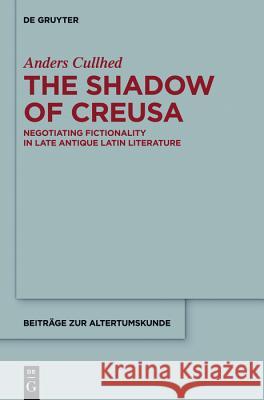The Shadow of Creusa: Negotiating Fictionality in Late Antique Latin Literature » książka
The Shadow of Creusa: Negotiating Fictionality in Late Antique Latin Literature
ISBN-13: 9783110559248 / Angielski / Miękka / 2017 / 724 str.
The Shadow of Creusa: Negotiating Fictionality in Late Antique Latin Literature
ISBN-13: 9783110559248 / Angielski / Miękka / 2017 / 724 str.
(netto: 144,43 VAT: 5%)
Najniższa cena z 30 dni: 150,60 zł
ok. 22 dni roboczych.
Darmowa dostawa!
Anders Cullhed's study The Shadow of Creusa explores the early Christian confrontation with pagan culture as a remote anticipation of many later clashes between religious orthodoxy and literary fictionality. After a careful survey of Saint Augustine's critical attitudes to ancient myth and poetry, summarized as a long drawn-out farewell, Cullhed examines other Late Antique dismissals as well as appropriations of the classical heritage. Macrobius, Martianus Capella and Boethius figure among the Late Antique intellectuals who attempted to save or even restore the old mythology by means of allegorical representation. On the other hand, pious poets such as Paulinus of Nola and Bible epic writers such as Iuvencus or Avitus of Vienne turned against pagan lies, and the mighty arch-bishop of Milan, Saint Ambrose, played off unconditional Christian truth against the last Roman strongholds of cultural pluralism. Thus, The Shadow of Creusa elucidates a cultural conflict which was to leave traces all through the Middle Ages and reach down to our present day.
Anders Cullhed's study The Shadow of Creusa explores the early Christian confrontation with pagan culture as a remote anticipation of many later clashes between religious orthodoxy and literary fictionality. After a careful survey of Saint Augustine's critical attitudes to ancient myth and poetry, summarized as a long drawn-out farewell, Cullhed examines other Late Antique dismissals as well as appropriations of the classical heritage. Macrobius, Martianus Capella and Boethius figure among the Late Antique intellectuals who attempted to save or even restore the old mythology by means of allegorical representation. On the other hand, pious poets such as Paulinus of Nola and Bible epic writers such as Iuvencus or Avitus of Vienne turned against pagan lies, and the mighty arch-bishop of Milan, Saint Ambrose, played off unconditional Christian truth against the last Roman strongholds of cultural pluralism. Thus, The Shadow of Creusa elucidates a cultural conflict which was to leave traces all through the Middle Ages and reach down to our present day.











